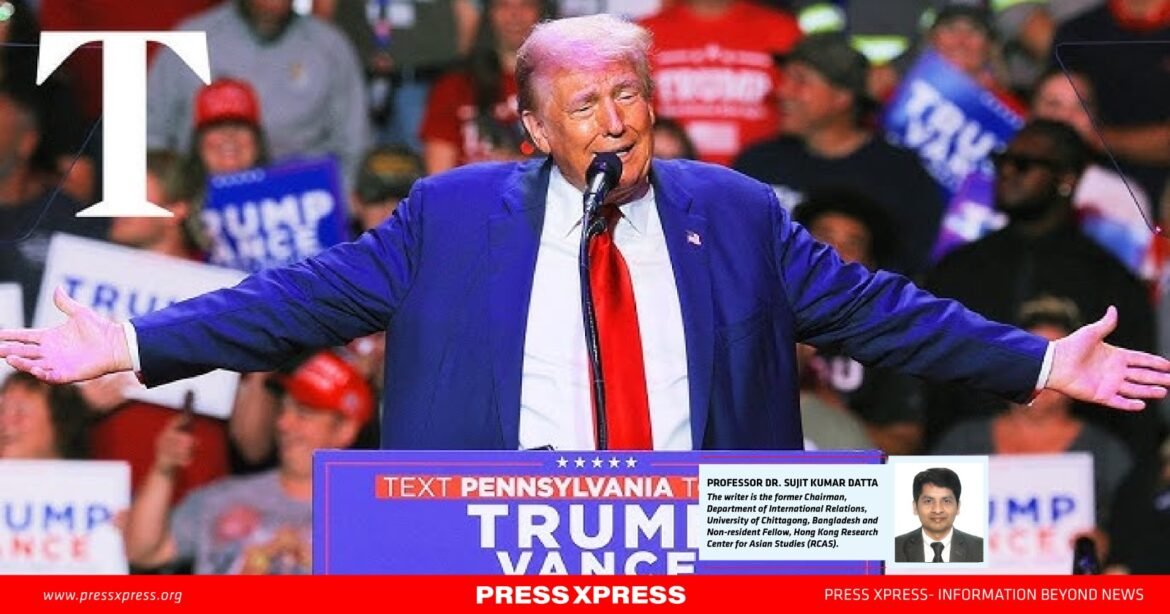The role of war and conflict in American politics is vital, especially since realism is one of the cornerstones of their foreign policy. According to realist theory, states often advocate using military force to protect interests and maintain power. The United States, as one of the proponents of this policy, regarded the war as an integral part of its foreign policy.
However, presidential candidate Donald Trump has vowed to avoid war if he wins the next election. He said there would be no new wars during his tenure, but he would try to get the U.S. out of the current crisis. Does Trump’s promise convey real change, or is it just a campaign trick?
Previous experiences of Trump’s opposition to war since the end of his term suggest he has no appetite for direct war. The last tenure of his government did not start a new war but instead tried to normalize relations through talks with the leaders of warring countries like Russia and North Korea. Trump met with North Korean leader Kim Jong Un 2018, an unforgettable historical moment. Although the long-term positive effects of the meeting were not visible, it opened up new opportunities.
In turn, Trump’s friendly attitude towards Russia has sparked tensions with Western allies. But he refused to engage in direct war with Russia. That’s why some Americans view Trump as a “peaceful” leader. He said dealing with the problem economically and diplomatically was more effective than military intervention.
U.S. foreign policy has long relied on military force. Since 2001, the United States has conducted military interventions in Afghanistan and Iraq in the name of fighting terrorism. These protracted wars devastated the U.S. economy, costing millions of military lives. Meanwhile, Trump said such wars only paint a picture of failure, with Americans focusing on their security.
What stands out in Trump’s speech now is his promise that the American military will no longer be sent to war overseas. He wants to prioritize resolving conflicts in Ukraine and Gaza, favoring diplomatic over military intervention. Trump’s comments have raised concerns about the tenure of his rival, especially Democratic candidate Kamala Harris. Trump has stated that if Kamala wins, the U.S. presence in the Middle East will increase, and the war situation will become more complicated. But how realistic are his statements?
According to American election experts, Trump’s anti-war rhetoric may serve as a strategy for his election campaign. Because in the current situation, most U.S. citizens want to stay out of war. Therefore, Trump’s promise sends them a liberating message. The cost of war is putting pressure on the American economy, and now people are looking for leadership that can reduce the risk to their children’s lives.
Trump promised that he would resolve international crises peacefully if he won the upcoming election. He said the United States has been involved in several international crises under the current Biden administration, especially in Ukraine and Gaza. He noted that the Biden administration has exacerbated the situation and failed to move towards solutions. Trump’s diplomatic policy will play an essential role in shaping his solution. He wants to resolve the problem through negotiations rather than war. However, questions are being raised about the validity of Trump’s statements.
American politicians and critics believe that after winning the election, reality may change, and he will not be able to fulfill his promises. The U.S. military has long played an essential role in the country’s foreign policy. However, Trump says the military should only be used for national security. As a result of U.S. international intervention, many countries consider the U.S. an enemy.
The Trump administration has focused on reducing this hostility. But of course, Trump’s position is not just his personal opinion; some segments of the U.S. population also support this position. American military assets and lives are at stake during the war. Therefore, Trump’s promise may positively impact him in the elections.
Many believe that Trump’s anti-war pledges can only be used as a campaign tactic. Anti-war stances are usually helpful in gaining public support, especially when there is widespread frustration with war and conflict among the public. Trump wants to present himself as a symbol of peace by criticizing his rival Biden’s war policies. Such a stance could help Trump’s campaign, but its implementation would be a completely different story.
To what extent Trump will fulfill his promises, given the U.S.’s military and economic interests, remains a question. Trump’s anti-war policies have provoked mixed reactions among Americans. Some citizens support his stance, believing that the United States can become more acceptable in the international arena by avoiding war. On the other hand, many analysts believe that this pledge is just a strategy and that it will not be possible for Trump to implement it.
In addition, many believe that the United States cannot maintain its interests without war. For example, stability in the Middle East is essential to the United States. Therefore, it is impossible to preserve American interests without fighting there. Consequently, it remains to be seen how voters will react to Trump’s promises.
There is a reasonable debate about whether Trump’s anti-war promise represents a fundamental change or whether it is simply part of an election campaign. The United States maintained its hegemony during the war. However, Trump promised to move away from this conventional policy, which could change U.S. foreign policy. However, the question remains about how far Trump will be able to fulfill this promise. How sincere and realistic his promises are will only be known after the election, when he takes further steps in his regime.


